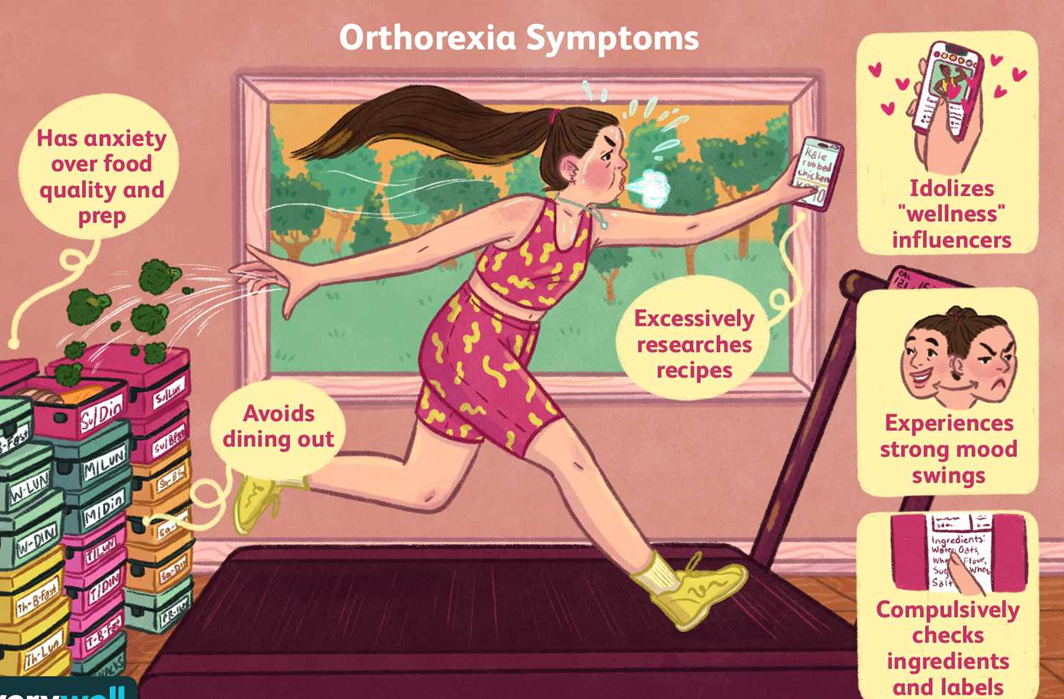A nurse is caring for a client who reports that they have been eliminating specific foods from their diet in order to “eat clean.” The nurse should identify that this is an indication of which of the following conditions?
Anorexia nervosa
Rumination disorder
Orthorexia
The Correct Answer is C
Choice A Reason: Anorexia Nervosa
Anorexia nervosa is an eating disorder characterized by an intense fear of gaining weight and a distorted body image, leading to restricted food intake and excessive weight loss. Individuals with anorexia nervosa often have a relentless pursuit of thinness and may engage in extreme dieting, excessive exercise, and other behaviors to lose weight. While eliminating specific foods can be a part of anorexia nervosa, the primary focus is on weight loss and body image rather than the purity or healthiness of the food.
Choice B Reason: Rumination Disorder
Rumination disorder involves the repeated regurgitation of food, which may be re-chewed, re-swallowed, or spit out. This condition is more common in infants and individuals with developmental disabilities but can occur in people of all ages. The behavior is typically involuntary and not related to concerns about food purity or healthiness. Therefore, it does not align with the client’s report of eliminating specific foods to “eat clean.”
Choice C Reason: Orthorexia
Orthorexia is an eating disorder characterized by an obsession with eating foods that one considers healthy or pure. Individuals with orthorexia may eliminate entire food groups, such as sugars, carbohydrates, or dairy, in their quest to maintain a “clean” diet6. This condition can lead to malnutrition and social isolation due to the restrictive nature of the diet. The client’s report of eliminating specific foods to “eat clean” is a clear indication of orthorexia.

Nursing Test Bank
Naxlex Comprehensive Predictor Exams
Related Questions
Correct Answer is ["5"]
Explanation
Step 1: Determine the concentration of Heparin in units per mL. 25,000 units ÷ 250 mL = 100 units per mL Result: 100
Step 2: Determine the rate in mL per hour needed to deliver 500 units per hour. 500 units ÷ 100 units per mL = 5 mL per hour Result: 5 mL per hour
The nurse should set the infusion pump to deliver at a rate of 5 mL per hour.
Correct Answer is A
Explanation
Choice A Reason:
Strong negative feelings interfere with assessment and judgment.
This statement is the most accurate explanation for why a nurse needs to be aware of their own feelings while working with a family experiencing domestic violence. Negative emotions such as anger, frustration, or sadness can cloud a nurse’s judgment and hinder their ability to objectively assess the situation. These feelings can lead to biased decision-making, which may compromise the quality of care provided to the victim. For instance, a nurse who feels anger towards the abuser might unconsciously project these feelings onto the victim, affecting their ability to offer unbiased support and intervention. Therefore, maintaining emotional awareness is crucial for ensuring accurate assessments and effective interventions.
Choice B Reason:
Awareness protects one’s own mental health.
While it is true that being aware of one’s feelings can help protect a nurse’s mental health, this statement does not directly address the impact of these feelings on the assessment and judgment process. Emotional awareness is important for self-care and preventing burnout, but the primary rationale for emotional awareness in the context of domestic violence is to ensure that the nurse can provide objective and effective care. Therefore, this choice is not as relevant to the specific question as choice A.
Choice C Reason:
Positive feelings promote the development of sympathy for clients.
Positive feelings such as empathy and compassion are important in nursing, but they can also lead to over-identification with the client, which may result in blurred professional boundaries. While sympathy can foster a supportive relationship, it is essential for nurses to maintain a balance between empathy and professional detachment to provide objective care. This statement does not fully capture the importance of emotional awareness in preventing negative feelings from interfering with assessment and judgment.
Choice D Reason:
Strong positive feelings lead to underinvolvement with the victim.
This statement is less accurate because strong positive feelings, such as empathy and compassion, are more likely to lead to over-involvement rather than underinvolvement. Over-involvement can result in blurred boundaries and difficulty maintaining professional objectivity. However, the primary concern in the context of domestic violence is the interference of negative feelings with assessment and judgment, making this choice less relevant to the question.
Whether you are a student looking to ace your exams or a practicing nurse seeking to enhance your expertise , our nursing education contents will empower you with the confidence and competence to make a difference in the lives of patients and become a respected leader in the healthcare field.
Visit Naxlex, invest in your future and unlock endless possibilities with our unparalleled nursing education contents today
Report Wrong Answer on the Current Question
Do you disagree with the answer? If yes, what is your expected answer? Explain.
Kindly be descriptive with the issue you are facing.
